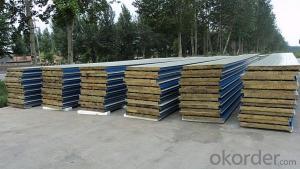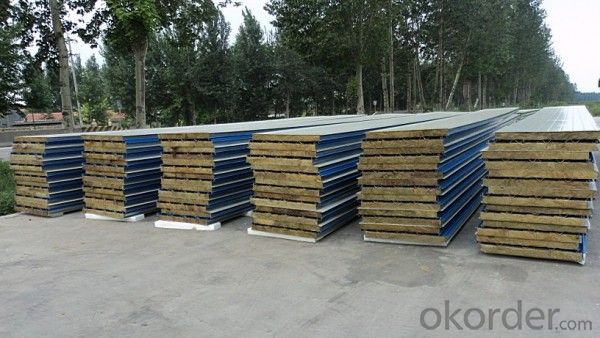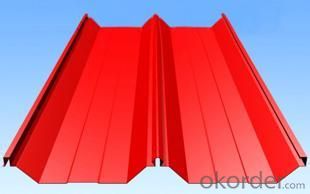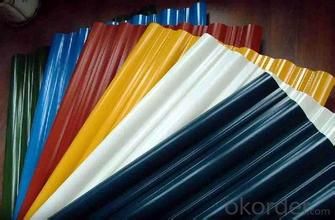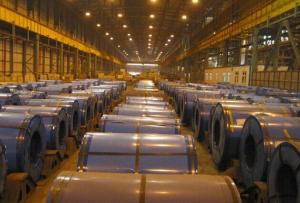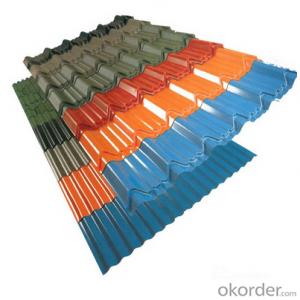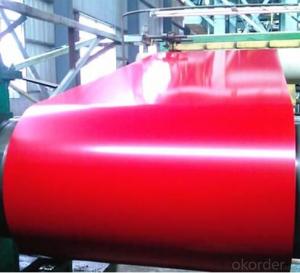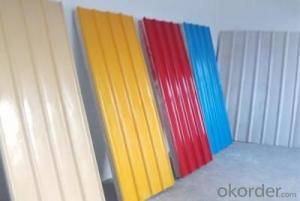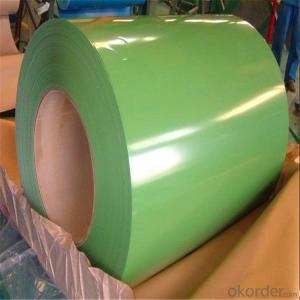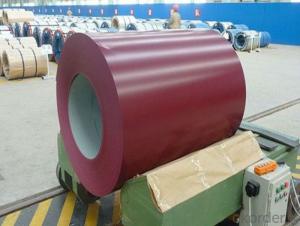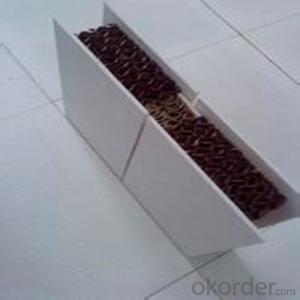PPGI steel sheets
- Loading Port:
- China Main Port
- Payment Terms:
- TT OR LC
- Min Order Qty:
- -
- Supply Capability:
- -
OKorder Service Pledge
Quality Product, Order Online Tracking, Timely Delivery
OKorder Financial Service
Credit Rating, Credit Services, Credit Purchasing
You Might Also Like
Packaging & Delivery
| Packaging Detail: | seaworthy expot package for Corrugated roofing steel |
| Delivery Detail: | on request for Corrugated roofing steel |
Specifications
Corrugated roofing steel
1.10 year's experience
2. advanced coating equipment
3.competitive price
4.various color
- Q: Can steel sheets be used for solar panel structures?
- Yes, steel sheets can be used for solar panel structures. Steel is a durable and strong material that can provide structural support for solar panels. It is commonly used for mounting frames, racking systems, and other components of solar panel structures due to its ability to withstand various weather conditions and provide stability.
- Q: Can steel sheets be used for elevator shafts or doors?
- Yes, steel sheets can be used for elevator shafts or doors. Steel is a commonly used material in the construction of elevator shafts and doors due to its strength, durability, and fire resistance properties.
- Q: Are steel sheets suitable for HVAC systems?
- Yes, steel sheets are suitable for HVAC systems. Steel sheets are commonly used in HVAC systems due to their high strength, durability, and resistance to corrosion. They can be fabricated into various shapes and sizes to meet the specific requirements of HVAC components, such as ductwork, air handlers, and heat exchangers. Additionally, steel sheets can effectively withstand the high temperatures and pressures often encountered in HVAC applications.
- Q: How are steel sheets classified based on their surface finish?
- Steel sheets are classified based on their surface finish into categories such as hot rolled, cold rolled, and coated finishes.
- Q: Can the steel sheets be painted or coated?
- Yes, steel sheets can be painted or coated. Painting or coating steel sheets is a common practice in various industries to enhance the appearance, protect against corrosion, and improve durability. The steel surface should be properly cleaned and prepared before applying any paint or coating to ensure proper adhesion. Different types of paints or coatings can be used depending on the desired finish, environmental conditions, and the specific application. It is important to select the appropriate type of paint or coating that is compatible with the steel substrate and can withstand the intended use and exposure to chemicals, moisture, UV radiation, or other factors that may affect the performance and longevity of the coating.
- Q: How are steel sheets cleaned and maintained?
- There are various methods available for cleaning and maintaining steel sheets, depending on specific requirements and conditions. Below are some commonly used approaches: 1. Regular cleaning: It is important to clean steel sheets regularly to eliminate dust, dirt, and other debris that may accumulate on the surface. This can be accomplished by using a soft cloth or sponge along with mild soap or detergent and warm water. It is advisable to avoid abrasive cleaners or scrub brushes that can cause surface scratches. 2. Rust removal: Prompt removal of rust spots is crucial to prevent further corrosion on steel sheets. Rust can be eliminated using a wire brush, sandpaper, or a rust remover solution. Once removed, the area should be thoroughly cleaned and dried. 3. Protective coating: Applying a protective coating can help prevent rust and corrosion, especially for steel sheets exposed to harsh environments or moisture. Coating options include paint, varnish, or specialized anti-corrosion coatings. The coating should be applied in accordance with the manufacturer's instructions and reapplied periodically as needed. 4. Proper storage: To prevent moisture buildup and corrosion, it is important to store steel sheets in a dry and well-ventilated area. They should be kept away from direct contact with the ground and other metals to avoid galvanic corrosion. Additionally, using covers or protective wraps can provide further protection against dust and other contaminants. 5. Periodic inspection: Regularly inspecting steel sheets for any signs of damage, such as dents, scratches, or cracks, is essential. If any damage is identified, it should be promptly repaired to prevent further deterioration. 6. Professional maintenance: In the case of large-scale or complex steel sheet installations, it may be necessary to enlist professional maintenance services. These experts possess the knowledge, tools, and experience required to perform more extensive cleaning, maintenance, and repairs. By adhering to these cleaning and maintenance practices, steel sheets can maintain their integrity, appearance, and performance over time.
- Q: Are steel sheets resistant to UV rays?
- No, steel sheets are not inherently resistant to UV rays.
- Q: What is the average cost of installing steel sheets?
- The average cost of installing steel sheets can vary depending on various factors such as the size of the project, the type and quality of the steel sheets, the location, and the labor costs. On average, the cost of installing steel sheets can range from $7 to $15 per square foot. However, it is important to note that this is just a rough estimate and actual costs may vary significantly. It is recommended to obtain quotes from multiple contractors or steel suppliers to get a more accurate estimate for a specific project.
- Q: What are the different sheet metal stamping techniques for steel sheets?
- There are several sheet metal stamping techniques for steel sheets, including blanking, piercing, bending, deep drawing, and embossing.
- Q: Can steel sheets be used in food-grade applications?
- Yes, steel sheets can be used in food-grade applications. Stainless steel sheets are commonly used in various food processing and handling equipment, as they offer excellent resistance to corrosion, durability, and ease of cleaning.
Send your message to us
PPGI steel sheets
- Loading Port:
- China Main Port
- Payment Terms:
- TT OR LC
- Min Order Qty:
- -
- Supply Capability:
- -
OKorder Service Pledge
Quality Product, Order Online Tracking, Timely Delivery
OKorder Financial Service
Credit Rating, Credit Services, Credit Purchasing
Similar products
Hot products
Hot Searches
Related keywords
